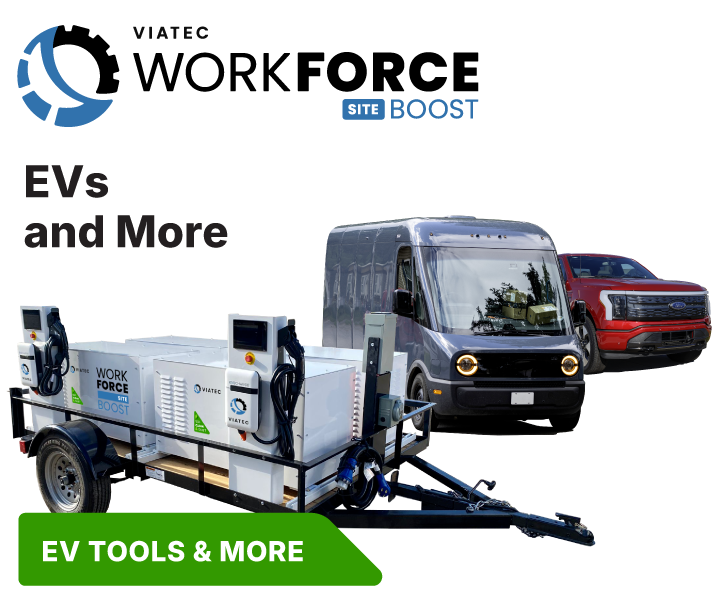ePTOs have been around a while and have changed radically. It all started by breaking some eggs…
Gen 1 ePTO: aka Helter SkelterPTO
- Pre-standardization. Various architectures and battery chemistries
- Huge (~1500 lbs or more), expensive (up to 100K), and unreliable
- Deeply integrated and when they failed, the device they were on also was also dead
- The situation was complicated…
- Frequently the buying decision was heavily influenced by company goals and pressure to demonstrate action on emissions reductions. A noble goal in need of a suitable solution. There weren’t any at the time
- Downtime related costs including repair, replacement vehicle rentals, and loss of productivity could reach the initial unit cost (60K+ to some fleets)
- When it went bad the buyer was still the buyer and took the hit
- So how did it go? Generally not great.
- In gen 1 everyone got burned by either the costs, hardware performance issues, actual fires, and this ended with companies closing, evolving or selling those divisions to mitigate their losses. It was a mess
- But, the crews did enjoy using those devices over an idling engine when they did work. This was the most important lesson of gen 1.
Gen 2 ePTO: Return of the ePTO (2013)
Chemistry is the best way to draw boundaries between the ePTO generations
- About 5 years ago ePTO battery technology veered toward Lithium Iron Phosphate (LiFePO). It is stable but heavy and expensive. Still, this was the right choice back then and brought some stability.
- Gen2s are more reliable than their parents
- But remain expensive with a 7 to 10 year payback period under reasonable Total Cost of Ownership models
- They are still deeply integrated and can’t reasonably be removed before resale. The result is a lower 10 residual value due to buyer fear of battery issues and other novel product concerns they won’t have to deal with if they get a regular one at market price. Removing the systems before resale can add 25% – 35% to the resale value due to the low engine hours and almost new mechanical PTO.
- These units still risk taking your truck out of commission if they do fail
- Gen 2 ePTOs cost between $50,000 and $80,000 for a unit large enough to operate a bucket truck boom, bucket, winch, for a full workday
- Annual fuel and maintenance savings, assuming no unexpected downtime, should be $4,500 to $9,500 (engine size, idle time, bucket movement, miles driven)
Gen 3 ePTO: (2018) — Parallel, Affordable, Reliable, Enjoyable
- Gen 3 ePTO: (2018) – Parallel, Affordable, Reliable, Enjoyable
- Yup, enjoyable. A reliable ePTO positively transforms the working experience for users in dramatic ways. Work can be peaceful and ground crews can freely communicate with operators without the need for communications equipment or hand signals
- The current generation of ePTOs use Lithium Ion NMC (Li[NiCoMn]O2) air-cooled batteries at ~$500.00 per kWh. The GHen 2 LIP were substantially more at $900–$1500 per kWh.. An average day will draw 4 to 10 kWh on a large platform. Gen3s will cost $7500 less per average system in batteries alone
- There has never been a failure of a Gen3 ePTO in the field and they do not require any regular maintenance
- Gen3s are truly parallel systems so if they run low or are damaged, the truck can be operated conventionally
- One offering is easily transferable truck to truck – if a truck needs to be replaced before a Gen3 ePTO has lived its 10 year life, it takes 4 hours of truck prep and 25 minutes to transfer the unit
- Annual fuel and maintenance savings will be $4,500 to $9,500 (depending on the application and vehicle engine size, idle time, bucket movement, miles driven).
- Operational oversight is web and app based so you can look at each vehicle and compare savings, usage patterns, derive crew behavior and training opportunities. On board Telematics allow for remote management, troubleshooting, software updates and remote performance adjustments to improve the crew experience
- Insane savings. By adding a Gen 3 ePTO to a new bucket truck, customers can expect to…
- pay $22,000 to $30,000
- save $60,000 to $90,000 in hard costs during the vehicle life (assume 5 hours of idling and 1.2 gallons per hour = 7 gallons a day)
- reduce engine wear, and required maintenance, by 69% while improving shop productivity (lifetime savings $20,000)
- increase resale value: at the end of a fleets usage cycle you can remove the system and sell a vehicle with 60% less engine hours and negligible mechanical PTO hours. This can add $20,000 to 30,000 to the sales price
- Per unit savings with a Gen 3 ePTO — $80,000 to $120,000
Gen 4 ePTOs: “Happy birthday Jimmy CrewBot” (2022 or so)
Artificial Intelligence (AI) will add helpful capabilities while we wait for the generation defining batteries.
- The next generation is likely 3–5 years out and is entirely dependent on [solid] Lithium Metal or another batteries achieving the goal of 5 times the energy density at 1/5 the price of today’s
- AI based on board trainer that can interact with the crew, maintain their schedules, watch the weather, remind them, of their wife’s birthday
- Safer than ever: Sure, a little creepy but only at first. AI support never stops paying attention and can multitask like no one’s business. Gen 4 ePTOs will become part of the crew. They will actively protect operators by continuous visual and audio monitoring of the operator surroundings.
- Autonomously identify threats to the operator, alert them and initiate life saving movement.
- This is going to require some serious testing and a lot of cultural change. In time crews will find “Jimmy CrewBot” is helpful, personably, useful to them. Jimmy will never lose focus on its mission of protecting his crew. That is how he will become part of the team. Afterthought: Luke Skywalker had R2-D2 — it wasn’t weird.
Epilogue
Gen 3 ePTOs can be scaled up or down and reconfigured to optimize for several applications including tankers, pumpers and pretty much anything that idles a lot.









